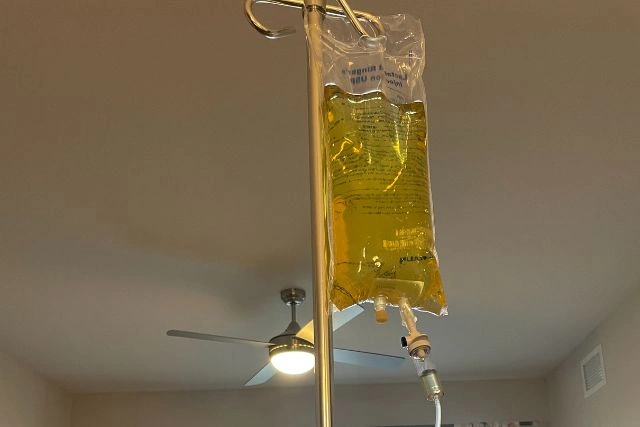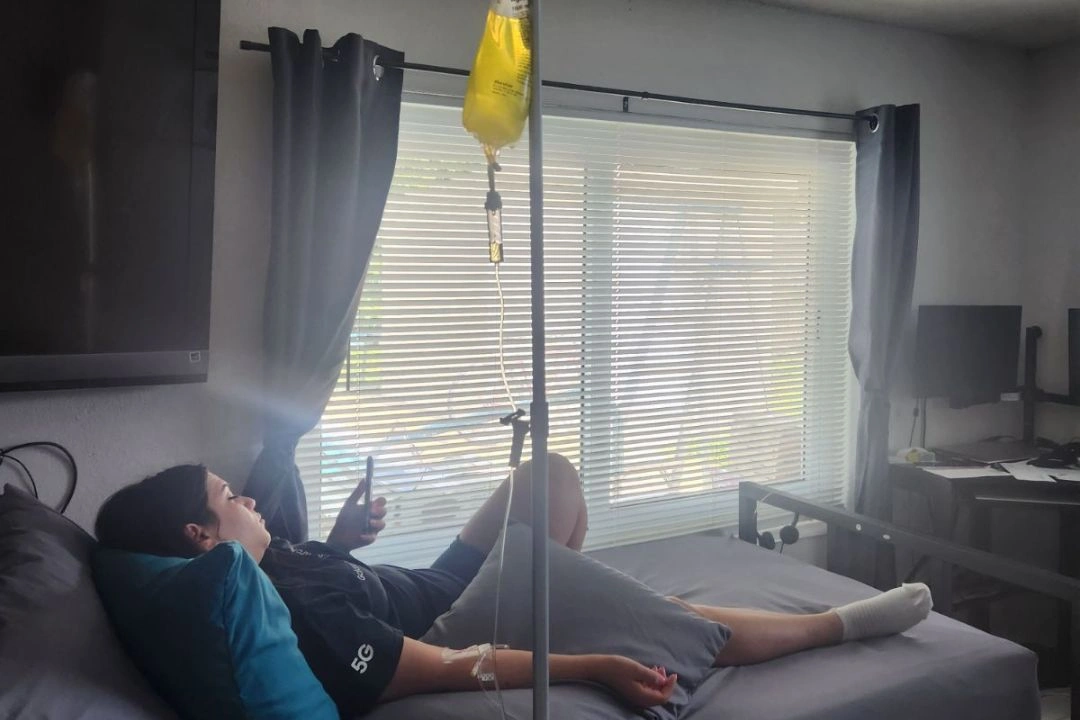Dehydration affects millions daily, which leads to fatigue, headaches, and poor concentration. When the body loses fluids, replenishing them quickly is crucial. Water is the most common solution, but it takes time to absorb.
In cases of severe dehydration, heat exhaustion, or illness, waiting for oral hydration to take effect isn’t ideal. Hydration IV can be the best option for quick rehydration, especially in hot and humid areas like Palm Beach County.
It delivers fluids and essential nutrients into the bloodstream, ensuring faster recovery and optimal performance when needed most. However, how does it truly compare to drinking water?
Let’s define via today’s thorough discussion on IV hydration vs drinking water.
IV Hydration Vs Drinking Water: Quick Differences
Go through this quick comparison table and find out whether IV hydration is better than drinking water:
| Factor | IV Hydration | Drinking Water |
| Absorption Speed | Immediate, enters the bloodstream directly | Slower, absorbed through digestion. |
| Nutrient Delivery | Can include electrolytes, vitamins, and minerals | Limited to natural minerals in water. |
| Customization | Customized hydration with nutrients | Minimal unless fortified water is used. |
| Use Cases | Medical treatment, rapid recovery, wellness support | Daily hydration, and general well-being. |
| Detoxification | Flushes toxins quickly with added antioxidants | Supports detox but at a slower rate. |
What Is IV Hydration Therapy?
IV hydration therapy is a medical technique designed to administer fluids, electrolytes, and essential nutrients directly into the bloodstream through an intravenous (IV) line. This method allows rapid absorption, bypassing the digestive system to ensure immediate and efficient rehydration.
The fluids consist of sterile saline or lactated Ringer’s solution, which helps restore electrolyte balance and maintain proper cellular function. Additional components such as vitamins, minerals, antioxidants, and medications may be incorporated depending on the patient’s needs.
IV hydration is utilized to manage dehydration resulting from severe vomiting, diarrhea, heat exhaustion, or excessive fluid loss. The process involves inserting a sterile catheter into a vein, through which a customized fluid solution is infused under medical supervision.
Benefits of IV Treatment for Hydration
IV hydration offers more than quick fluid absorption. It provides targeted hydration, supports overall wellness, and delivers essential nutrients faster than ever.
Enhanced Cellular Hydration
IV therapy delivers fluids straight into the bloodstream, ensuring optimal cellular hydration. It helps organs function efficiently, boosts energy levels, and prevents complications from dehydration.
Stronger Immune System
IV drips can include vitamins like C, B-complex, and zinc, strengthening the immune system. These nutrients help reduce inflammation, fight infections, and support long-term immune health.
Faster Toxin Elimination
Proper hydration helps the kidneys and liver flush out toxins more effectively. IV therapy supports detoxification, reduces oxidative stress, and improves overall metabolic balance.
Reduced Muscle Fatigue
Athletes and active individuals benefit from electrolyte-rich IV fluids that restore minerals like sodium, potassium, and magnesium. These fluids reduce muscle cramps, enhance endurance, and speed up post-workout recovery.
Improved Cognitive Function
Dehydration affects brain performance, leading to fatigue and poor concentration. IV therapy replenishes fluids and essential nutrients, helping to restore mental clarity, focus, and memory function.
Major Differences Between IV Hydration and Drinking Water

Here, we have highlighted all the key differences between IV fluids and drinking water to help you make an informed decision about your needs:
Absorption Speed
IV hydration provides immediate fluid absorption as it directly enters the bloodstream, and bypasses the digestive system. The body utilizes the fluids, electrolytes, and nutrients within minutes, making it the fastest method for rehydration. It is essential in cases of severe dehydration or medical emergencies.
In contrast, drinking water follows a slower absorption process, typically within a couple of hours for full hydration. The water must pass through the digestive system, where absorption occurs in the stomach and intestines. Various factors like food intake and individual metabolism can further delay the process.
Convenience
Drinking water is the most accessible and convenient method of hydration. It requires no medical supervision, equipment, or special preparation. You can hydrate anytime, anywhere, making it ideal for daily use and general well-being.
IV hydration, however, requires medical administration by trained professionals. The procedure involves inserting an intravenous line, which takes time and must be done in a controlled environment.
It requires scheduling an appointment, waiting for a professional to administer the drip, and setting aside time for the procedure.
To make things convenient, many people take advantage of mobile IV services in Palm Beach County.
Nutrient Delivery
IV hydration ensures direct and controlled delivery of essential nutrients, electrolytes, and vitamins into the bloodstream. It provides 100% bioavailability and your body can immediately absorb and utilize the nutrients without any loss.
IV therapy can be customized to include specific vitamins, minerals, and antioxidants based on your body’s needs.
Drinking water, on the other hand, does not provide additional nutrients unless fortified. The body absorbs minerals from water at a much slower rate, and the digestive system may filter out or limit the absorption of certain nutrients.
Additionally, various factors such as gut health and metabolism have a big impact on how well the body processes and retains these nutrients.
Effectiveness for Severe Dehydration
IV hydration is the most effective method to treat intense dehydration. When the body experiences significant fluid loss due to illness, excessive sweating, vomiting, diarrhea, or medical conditions, oral hydration alone may not be sufficient.
IV therapy delivers fluids, electrolytes, and essential nutrients and restores hydration levels quickly.
Conversely, drinking water relies on the digestive system for absorption and makes it a less effective option in emergencies.
When the body is dehydrated, the gastrointestinal tract may not function optimally, further delaying hydration. Nausea or vomiting from dehydration prevents fluid retention. That’s where IV therapy is the most effective solution for rapid rehydration and preventing complications.
Customization Options
IV hydration offers highly customizable solutions to specific needs. Depending on the individual’s condition, IV drips can include electrolytes, vitamins, antioxidants, amino acids, and medications.
It makes IV therapy beneficial for targeted treatments, such as immune support, athletic recovery, hangover relief, or chronic fatigue management. The precise composition ensures optimal absorption and immediate effectiveness.
Drinking water, in contrast, provides limited customization. While certain bottled or fortified waters contain added minerals or electrolytes, they do not offer the same level of precision or potency as IV hydration. Moreover, the body’s ability to absorb nutrients from water varies, and excess vitamins or minerals may be lost through digestion rather than being fully utilized.
When Should You Choose Hydration IV Therapy Over Drinking Water?
IV hydration is ideal when you need rapid rehydration, especially in situations where drinking water alone isn’t sufficient. Knowing when to choose IV vs drinking water depends on how quickly you need hydration.
Choose IV hydration over drinking water:
- When dehydration is severe due to excessive vomiting, diarrhea, or heat exhaustion.
- In medical emergencies that require immediate fluid restoration.
- If you’re unable to retain fluids because of nausea or vomiting.
- After intense physical activity for quick hydration and nutrient replenishment.
- When regular water intake is insufficient to maintain hydration levels.
- If you need a rapid infusion of vitamins, minerals, or electrolytes.
Additional Tips for Staying Hydrated
Proper hydration is essential for maintaining energy, cognitive function, and overall health. Here are some expert suggestions you can consider:
1. Follow a Hydration Schedule
Instead of waiting until you’re thirsty, set reminders to drink water regularly. Aim for small, consistent sips throughout the day rather than consuming large amounts at once.
2. Prioritize Electrolyte Balance
Water alone may not be enough for proper hydration. Consume electrolyte-rich foods like bananas, leafy greens, and nuts, or add electrolyte-enhanced drinks when sweating excessively.
3. Start Your Day with Water
Drinking a glass of water first thing in the morning helps kickstart metabolism, flush out toxins, and replenish fluids lost overnight. Adding lemon can enhance absorption and digestion.
4. Monitor Urine Color
A simple way to track hydration is by checking urine color. Pale yellow indicates good hydration, while dark yellow or amber suggests dehydration and the need to drink more fluids.
5. Eat Water-Rich Foods
Hydration doesn’t only come from drinks. Include water-dense foods like cucumbers, watermelon, oranges, and celery to boost fluid intake while providing essential vitamins and minerals.
In Closing
Both IV hydration and drinking water play essential roles in keeping your body hydrated. Drinking water is ideal for daily hydration, but IV therapy offers faster absorption, customized nutrients, and immediate results for those needing rapid recovery.
If you’re looking for a trusted hydration IV provider in Palm Beach County, we will be your trusted choice. Our professional team ensures safe, effective hydration therapy that helps you feel your best fast.
Frequently Asked Questions
How long does IV hydration last in the body?
IV hydration effects can last a few hours to a few days, depending on your body’s needs. It helps restore fluids and electrolytes quickly, keeping you hydrated longer than drinking water.
Can IV hydration help with hangovers or fatigue?
Yes! IV therapy replenishes fluids, electrolytes, and vitamins that your body loses after drinking alcohol or feeling exhausted. It helps you feel better much faster than just drinking water.
How often should I get IV hydration?
It depends on your lifestyle and health. Some people get IV therapy weekly for energy and wellness, while others only need it when recovering from dehydration, illness, or intense activity.

